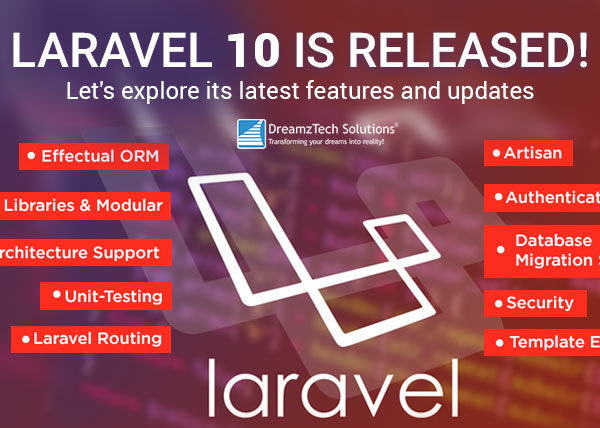In the world of web development, choosing the right framework is crucial. With so many options available, it can be overwhelming to determine which one is the best fit for your project.
Laravel, a PHP framework, has gained popularity among developers in recent years.Laravel is one of the most popular PHP frameworks in the world of web development, and for good reason. It offers a range of features and tools that make web development easier, more efficient, and more secure. In this blog, we’ll explore 15 reasons to choose Laravel for your next web development project in 2023.
1. Rapid Development :
Laravel provides a range of tools and features that make web development faster and more efficient. With its built-in Artisan CLI, you can generate boilerplate code, migrate databases, create tests, and more, all from the command line. Laravel’s Blade templating engine also makes it easy to create clean and readable HTML templates, reducing the amount of time spent on front-end development.
2. MVC Architecture:
Laravel follows the Model-View-Controller (MVC) architectural pattern, which separates the application logic from the presentation layer. This makes it easier to maintain and scale your application as it grows. The separation of concerns allows developers to work independently on different parts of the application, making the development process more efficient.
3. Eloquent ORM:
Eloquent ORM (Object-Relational Mapping) is a powerful feature of Laravel that simplifies database interactions. It provides a simple and elegant syntax for performing database queries and allows you to map database tables to model classes, reducing the amount of repetitive code required. Eloquent also supports relationships between tables, making it easier to handle complex database structures.
4. Authentication and Authorization:
Laravel provides built-in support for user authentication and authorization, making it easy to implement secure login systems and access control. Laravel also includes middleware for authorization, allowing developers to restrict access to certain parts of the application based on user roles and permissions.
5. Testing:
Laravel has a built-in testing suite that makes it easy to write and run automated tests for your application. The testing suite provides a range of testing tools, including unit tests, feature tests, and browser tests, making it easy to test all aspects of your application. This can help to ensure that your application is robust and reliable, reducing the risk of bugs and errors.
6. Security:
Security is a critical consideration for any web application, and Laravel takes security seriously. It includes built-in features to protect against common web application security risks, including SQL injection, cross-site scripting, and cross-site request forgery. Laravel also supports encryption and hashing, making it easy to protect sensitive data in transit and at rest.

7. Community Support:
Laravel has a large and active community of developers who contribute to its development and provide support to others. This community has created a range of open-source packages and resources that can be used to extend Laravel’s functionality and simplify development. The community also provides support through forums, Slack channels, and social media, making it easy to get help and advice when needed.
8. Scalability:
Laravel provides a range of features that make it easy to scale your application as it grows. It includes database sharding, load balancing, and caching, which help to ensure that your application remains responsive and reliable, even under heavy load.
9. Modern Web Development Practices:
Laravel is designed to work with modern web development practices, including continuous integration and deployment (CI/CD). It includes built-in support for popular CI/CD tools like Travis CI and CircleCI, making it easy to automate the testing, building, and deployment of your application.
10. Ease of Use:
One of the best things about Laravel is how easy it is to use. With its extensive documentation and active community, Laravel is accessible to developers of all skill levels. Whether you’re a beginner or an experienced developer, Laravel’s intuitive syntax and well-designed features make it easy to get started and build powerful web applications.
11. Blade Templating Engine:
Blade is Laravel’s lightweight and efficient templating engine, which allows developers to create clean and readable HTML templates. It has a simple syntax that is easy to learn and supports template inheritance, meaning that developers can create a base template and extend it across multiple pages, reducing the amount of code duplication.
12. Artisan CLI:
Artisan is Laravel’s command-line interface, which provides a range of useful commands for developers. With Artisan, developers can easily generate boilerplate code, migrate databases, create tests, and more, all from the command line. This can save developers time and effort, allowing them to focus on more important aspects of the project.
13. Continuous Integration and Deployment:
Laravel is designed to work with modern DevOps practices, including continuous integration and deployment (CI/CD). It includes built-in support for popular CI/CD tools like Travis CI and CircleCI, making it easy to automate the testing, building, and deployment of your application. This can save developers time and effort and reduce the risk of errors in the deployment process.
14. Artisan Command Scheduling Laravel’s Artisan CLI:
Artisan Command Scheduling Laravel’s Artisan CLI includes a command scheduling feature that makes it easy to schedule repetitive tasks such as database backups, sending emails, or clearing cache. You can define your commands and their schedule in a single configuration file, which makes it easy to manage and modify your scheduled tasks. With Artisan command scheduling, you can automate repetitive tasks and save valuable time for your development team.
15. Integration with Third-Party Services Laravel provides:
Integration with Third-Party Services Laravel provides a range of built-in tools and features that make it easy to integrate with third-party services such as payment gateways, email services, and social media platforms. Laravel supports popular APIs and SDKs, including Stripe, PayPal, AWS, Google Cloud, and many others. This makes it easy to integrate your web application with external services, saving you time and effort and providing your users with a seamless experience. With Laravel’s extensive library of third-party integrations, you can extend the functionality of your web application and enhance its user experience.
Conclusion:
In conclusion, Laravel is an excellent choice for web development projects in 2023. Its MVC architecture, Eloquent ORM, Blade templating engine, Artisan CLI, authentication and authorization, testing suite, community support, security features, scalability, and support for continuous integration and deployment make it a powerful and versatile framework for building robust and reliable web applications. With its ease of use and extensive documentation, Laravel is accessible to developers of all skill levels, making it an excellent choice for both small and large development teams. Whether you’re building a simple website or a complex web application, Laravel has the tools and features you need to bring your project to life.
If you want to hire laravel developer for your next project and ensure the developer follows the best practices of Laravel Development Services you are in the right place! DreamzTech Solutions is a leading Laravel Development Company in USA with development offices in USA, UK & India. Hire Laravel Developer from our 250+ Development Team and Create your web application result-oriented, scalable, robust, secure.



